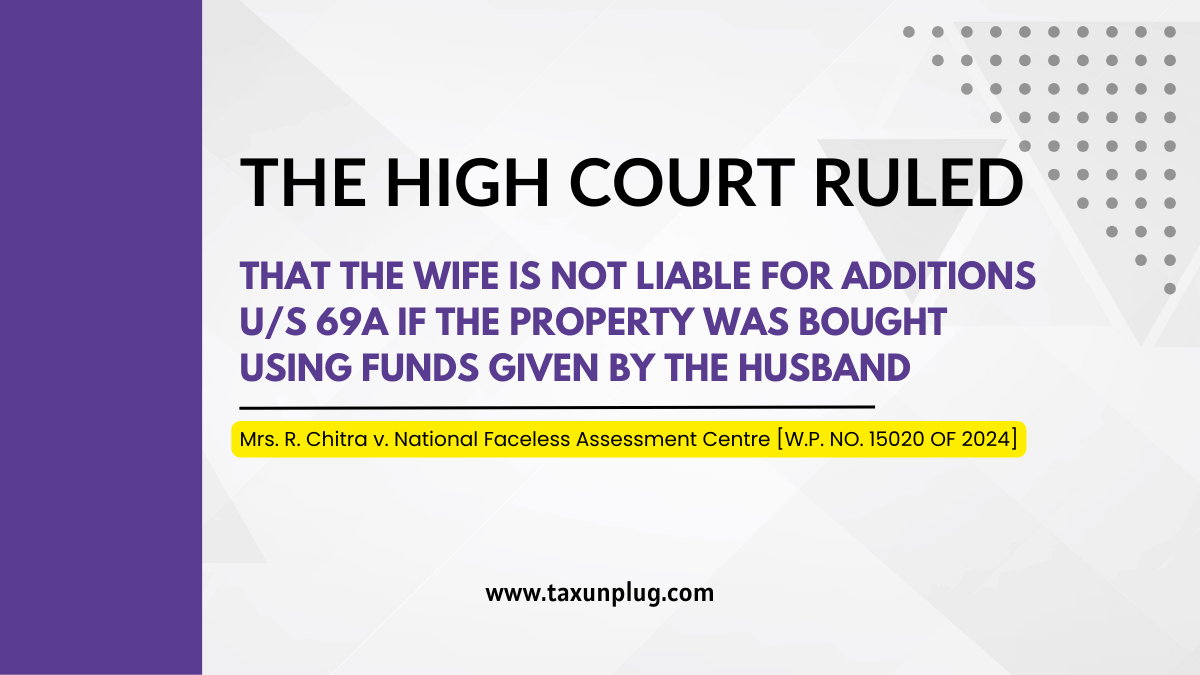The High Court ruled that the wife is not liable for additions:
Mrs. R. Chitra v. National Faceless Assessment Centre [W.P. NO. 15020 OF 2024]
The assessee did not file her income tax return as income was below the exemption limit. She acquired an immovable property in Thottipalayam Village, Tiruppur, for Rs.1.56 crore. Upon being informed about the said purchase, a show cause notice u/s 148A(b) of the Income Tax Act, 1961 was issued to the assessee. Following the assessee’s response, an order u/s 148A(d) was issued.
Being dissatisfied with such reply, a show cause notice on 17.02.2024 was issued calling upon the assessee to show cause as to why proposed variations in respect of the addition of a sum of Rs.1,56,96,000/- u/s 69A and a further sum of Rs.26,16,000/- u/s 56(2)(vii)(b) should not be imposed. After the assessee’s reply, the assessment order was issued on 13.03.2024.
The assessee’s Authorized representative argued that the immovable property was purchased from her husband’s funds directly to the vendor, and that she provided bank statements from her AXIS Bank account, which was noted in the order.
The assessee argued that Section 69A only applies to assessees who maintain books of account, as she does not maintain her books of accounts. The learned AR argued that the assessee’s reply, dated 30.01.2024, clearly stated that the property was purchased from her husband’s funds and is accounted for in her books. The AR also noted that the bank statements were uploaded.
The Departmental representative claimed that the assessee failed to submit their income tax return and only provided partial information on 16.10.2023. He argued that the assessing officer assumed tax evasion due to the assessee’s failure to provide ledger accounts and the relevant balance sheet. The counsel contends that the decision to include Rs.1,56,96,000/- and Rs.26,16,000/- in the assessment is justified, as the stamp duty was calculated based on the market value of Rs.1,83,12,000/- by the registering authority.
The Hon’ble High Court observed that clause u/s 69A pertains to unexplained money and requires taxpayers to provide a valid explanation if they fail to document relevant income or assets. Failure to do so will result in the funds or assets being considered as the taxpayer’s income. If a taxpayer not required to maintain financial records is found with unexplained funds, they must provide an explanation or face the same consequences. This is evident from the inclusion of the phrase “books of account, if any,” in Section 69A, which prevents taxpayers from evading consequences.
The assessing officer initially accepted the assessee’s explanation for the addition of Rs.1,56,96,000, but was concerned about the Rs.26,16,000 difference in values. The assessee provided a registered sale deed and bank statement to prove the source of funds, stating they were recorded in her husband’s financial records. She requested a chance to provide more details if needed. Bank statements highlighting payments made directly to the vendor were submitted. However, the assessee did not provide her husband’s income tax return or ledger account for the property purchase.
The assessee’s AR argued that the Income Tax Department did not request the documents, but it was still the assessee’s responsibility to prove the origin of the funds and show that the amount was accurately disclosed, and taxes were paid. The assessee had provided evidence that her husband financed the acquisition of the real estate. If he had disclosed this income and paid taxes, it would have led to double taxation.
Upon re-evaluation, it was found that the market value of the property was Rs.1,83,12,000/- instead of Rs.1,56,96,000/-. The difference of Rs.26,16,000/- was added to the assessee’s income. The assessee’s counsel argued that the wrong section was mentioned in the show cause notice, but upon examination, it was determined that the correct section was applied. Stamp duty was paid on the higher value, exceeding the thresholds specified in the relevant section. Ultimately, the mention of a different provision in the notice does not invalidate the order.
The assessment order was set aside for the addition of Rs.1,56,96,000 only.
The High Court ruled that the wife is not liable for additions
To download official order, click here.
“The site is for information purposes only and does not provide legal advice of any sort. Viewing this site, receipt of information contained on this site, or the transmission of information from or to this site does not constitute an attorney-client relationship. The information on this site is not intended to be a substitute for professional advice.”

